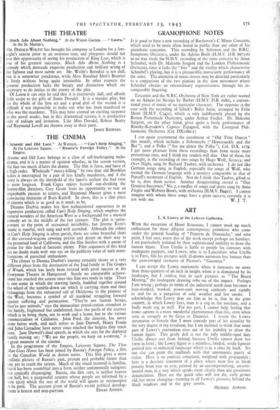GRAMOPHONE NOTES
h is good to have a new recording of Beethoven's C Minor Concerto, which used to be more often heard in public than any other of his pianoforte concertos. This recording by Solomon and the B.B.C. Symphony Orchestra, under Sir Adrian Boult (H.M.V. D.B. 8973-6) in no way rivals the H.M.V. recording of the same concerto by Artur Schnabel, with Dr. Malcolm Sargent and the London Philharmonic Orchestra, since it lacks the " bite " and the vitality which characterise Sclutabel's playing, but it is a pleasurable, musicianly performance all the same. The attention of music-lovers may be directed particularly to a comparison of the two pianists in the slow movement where Schnabel obtains an extraordinary expressiveness through his in- comparable fingering.
Toscanini and the N.B.C. Orchestra of New York are rather wasted on an Adagio for Strings by Barber (H.M.V. D.B. 618o), a conven- tional piece of music of no particular character. The opposite is the case with the recording of Gluck's Ballet Suite, arranged by Felix Mottl (H.M.V. C342o), which is only indifferently played by the Boston Promenade Orchestra, under Arthur Fiedler. Dr. Malcolm Sargent, on the other hand, gives quite a lively performance of Rimsky-Korsakov's Caprice Espagnol, with the Liverpool Phil- harmonic Orchestra (Col. DXII8o-1).
I can again recommend the instalment of "Old Time Dances" this month, which includes a Schottische (" Honeysuckle and the Bee "), and a Polka (" See me dance the Polka "), Col. DX. ir79. I get more pleasure from these recordings than from many more pretentious ones, and I think my readers will also. One of these, for example, is the recording of two songs by Hugo Wolf, Secrecy, and Over Night, sung by Richard Tauber, with orchestra. I do not like German songs sung in English, especially the songs of Wolf, who treated the German language with a mastery comparable to that of Purcell's treatment of English. Nor do I think that Tauber, gifted as he is, does them justice. Another disappointing record is "Our Greatest Successes," No. 2 a medley of songs and duets sung by Anne Ziegler and Webster Booth, with orchestra (H.M.V. 139401). I cannot imagine with whom these songs have a great success, certainly it is


























 Previous page
Previous page